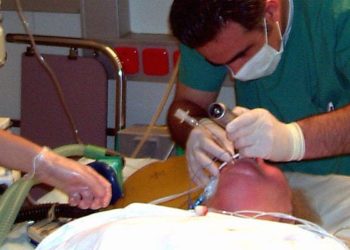Nasal high-flow therapy improves likelihood of neonatal intubation
1. In infants undergoing endotracheal intubation, nasal high-flow therapy improved the likelihood of successful intubation on the first attempt.
2. Nasal high-flow therapy did not cause physiological instability in the infant while undergoing endotracheal intubation.
Evidence Rating Level: 1 (Excellent)
Study Rundown: Rates of successful neonatal intubation on the first attempt are low, due to a multitude of factors, including inexperienced operators and a longer duration of intubation attempt. Additionally, the increasing use of noninvasive respiratory support and surfactant administration techniques for use in preterm infants has contributed to a declining trend in clinicians being proficient in neonatal intubation. However, successful first intubation is crucial, as repeat attempts are associated with adverse events such as intraventricular hemorrhage and airway injury. Nasal high-flow therapy has been proposed to aid intubation attempts and prolong the safe apneic window and has shown to be helpful in older children and adults. However, there is a gap in knowledge as to understanding the benefit of high-flow therapy during intubation in neonates. This study found that high-flow therapy during oral neonatal endotracheal intubation improves the likelihood of successful intubation on the first attempt. This study was limited by treatment assignments not being concealed and not performing a sham procedure. Nevertheless, these study’s findings are significant, as they demonstrate that the use of high-flow nasal therapy during endotracheal intubation led to a greater likelihood of successful intubation on the first attempt in neonates.
Click to read the study in NEJM
Relevant Reading: A Randomized Trial of Laryngeal Mask Airway in Neonatal Resuscitation
In-Depth [randomized control trial]: This randomized control trial was conducted at two neonatal intensive care units in Australia, studying 251 intubations in 202 infants. Patients who were undergoing oral endotracheal intubation in the delivery room or neonatal intensive care unit were eligible for the study. Patients who underwent nasal intubation, urgent intubation as determined by the treating clinician, or had a heart rate of less than 120 bpm before randomization, contraindication to high-flow therapy, or proven severe acute respiratory syndrome coronavirus infection were excluded from the study. The primary outcome measured was successful intubation on the first attempt without physiological instability of the infant. Successful intubation was defined as the completion of the intubation attempt with the correct placement of the endotracheal tube. Physiological instability was defined as an oxygen desaturation of more than 20% from baseline or bradycardia of less than 100 bpm during the first intubation attempt. Outcomes in the primary analysis were assessed via an intention-to-treat basis with generalized linear regression models. Based on the analysis, in the high-flow group, successful intubation without physiological instability on the first attempt was achieved in 50% of the infants, and in 31.5% of the standard-care group (adjusted risk difference, 17.6%; 95% Confidence Interval [CI], 6 to 29.2). The number needed to treat was 6 for 1 infant to benefit (95% CI, 4 to 17). Furthermore, regardless of physiological stability, successful intubation on the first attempt was achieved in 68.5% of the high-flow group patients and in 54.3% of the standard-care group patients (adjusted risk difference, 15.8%; 95% CI, 4.3 to 27.3). Overall, this study demonstrates that nasal high-flow therapy during neonatal endotracheal intubation improves the likelihood of a successful first intubation attempt without disturbing the physiological stability of the infant.
Image: PD
©2022 2 Minute Medicine, Inc. All rights reserved. No works may be reproduced without expressed written consent from 2 Minute Medicine, Inc. Inquire about licensing here. No article should be construed as medical advice and is not intended as such by the authors or by 2 Minute Medicine, Inc.








